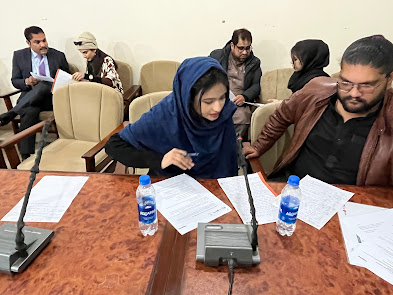 |
| Editing podcast scripts at Quetta radio seminar |
Balochistan region overcomes reputation
(QUETTA, BALOCHISTAN PROVINCE, PAKISTAN)—I always love coming to so-called “dangerous” places because my visits always confirm the fact that they really aren’t as bad as they’re portrayed to be. Lebanon and Ethiopia immediately come to mind.
When it comes to dangerous reputations, not many places
exceed this region and city, situated only 120 miles from the Afghan border.
Google “Quetta Balochistan news” and you’ll get stories
about an attack on a police academy, an attack on a church, the educational
crisis, and so on. Google “Quetta Balochistan terrorism” and you’ll get more
stories than Google can count.
Despite this, my impressions of this place are entirely
positive. Yes, violence does occur here, but Balochistan is much more than just
terrorist attacks.
I’m here working with radio journalists on script writing and podcasting on a project organized by the Global Neighborhood for Media Innovation, the U.S. Consulate-Karachi, and the East-West Center, which is lending my services as a trainer to the project.
During this seminar, I led a discussion about peace journalism. One
of PJ’s principles is to offer counternarratives to de bunk media generated and
perpetuated stereotypes, myths, and misperceptions. This principle is obviously
applicable to Balochistan, since 99% of the news about the region is negative,
and spotlights only violence. Peace journalism practitioners would look to tell
counternarrative stories about Balochistan—stories about business, education,
commerce, athletes, etc., that give a more complete view of the people and
region.
 |
| Balochistan journalists learn about podcasting |
One of the 23 participating journalists also asked about how
to best report in a conflict zone. Taking care of their own security is most
important, of course. After that, I said that sometimes the best we can do is
to not make a bad situation worse by sensationalizing the violence, prematurely
blaming this or that group for an attack, or creating even more hatred against
the perpetrators or their ethnic group.
I admire these journalists for their resilience. Working
here is difficult, yet they seem committed to upholding the best principles of
the profession.
I look forward to my next visit to Quetta, and hope to have
more time to explore the scenic beauty of this misunderstood place.
No comments:
Post a Comment